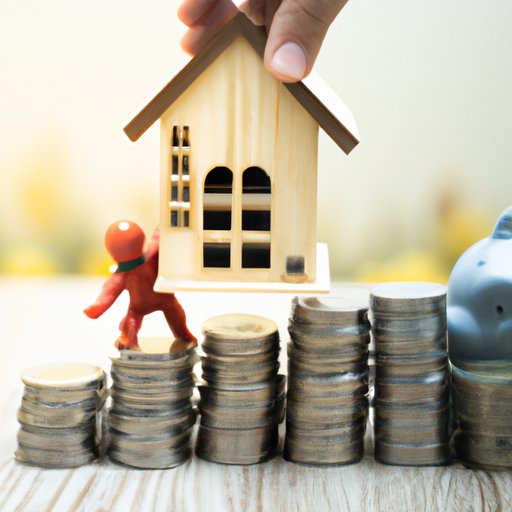Introduction
The decision to buy a home is a major milestone in life, both financially and emotionally. For many people, buying a home is not only seen as a way to provide stability for their family, but also as an investment that will pay off in the long run. But is home ownership really a good investment? This article will explore the pros and cons of investing in a home and help you decide if it’s the right choice for you.
Analyzing the Pros and Cons of Home Ownership as an Investment
When it comes to investing in a home, there are both financial and emotional benefits to consider. Let’s take a look at some of the pros and cons of home ownership as an investment.
Financial Benefits
One of the biggest advantages of buying a home is the potential for long-term financial gain. As your home appreciates in value over time, you can use it as collateral to borrow money or tap into its equity when needed. Additionally, you can save on taxes by deducting mortgage interest and property taxes from your income. Depending on where you live, you may also be eligible for other tax breaks, such as first-time homebuyer credits.
Advantages & Disadvantages
In addition to the financial benefits, home ownership provides stability and a sense of community. You can customize your home to fit your lifestyle and make it a place where you feel safe and secure. On the downside, home ownership requires a significant upfront investment and ongoing maintenance costs. You may also have to deal with unexpected repairs or other unforeseen expenses.

Examining the Tax Implications of Home Ownership
Taxes are another important factor to consider when deciding whether or not to invest in a home. Here’s what you need to know about the tax implications of home ownership.
Property Taxes
If you own a home, you’ll be subject to local property taxes. The amount you’ll owe depends on the value of your home and the tax rate in your area. While property taxes can be a burden, they’re often deductible from your federal income taxes.
Capital Gains Tax
If you sell your home for more than you paid for it, you’ll be subject to capital gains tax on the difference. Generally, you won’t have to pay capital gains tax if you lived in the home for at least two years and the profit from the sale is less than $250,000 for single taxpayers or $500,000 for married couples filing jointly.

Evaluating the Risks and Rewards of Investing in a Home
Investing in a home involves both risks and rewards. Here’s what you need to know before taking the plunge.
Risk Factors
The biggest risk associated with buying a home is the possibility of losing money if the value of your home depreciates in the future. Additionally, if you’re unable to keep up with mortgage payments, you could face foreclosure or bankruptcy. It’s important to carefully consider all of these risks before making a decision.
Potential Rewards
On the other hand, investing in a home can be incredibly rewarding. Not only will you get to enjoy the financial and emotional benefits of owning a home, but you could also reap the rewards of a profitable sale down the road. Additionally, living in a home that you own can give you a sense of pride and accomplishment.

Determining if Home Ownership is a Smart Investment Choice
Before you decide to invest in a home, there are several factors you should consider.
Considerations
First and foremost, you should make sure you can afford the upfront and ongoing costs of home ownership. Additionally, you should research the local real estate market to determine if now is a good time to buy. Finally, you should consider the long-term implications of investing in a home and decide if it’s the right choice for you.
Long-Term Outlook
When it comes to the long-term outlook, it’s important to remember that the value of your home can fluctuate over time. Additionally, you may have to deal with unexpected expenses or changes in the local market that could affect your bottom line. Ultimately, it’s important to weigh the potential risks and rewards before making a decision.
Conclusion
Buying a home is a major decision that requires careful consideration. While there are financial and emotional benefits to home ownership, there are also potential risks and rewards. By researching the local market, understanding the tax implications, and weighing the pros and cons, you can decide if home ownership is the right choice for you.
Summary of Key Points
When deciding if home ownership is a good investment, there are several factors to consider, including financial benefits, tax implications, and potential risks and rewards. Additionally, it’s important to research the local market and understand the long-term implications of investing in a home.
Final Recommendations
Ultimately, home ownership is a personal decision that should be based on your individual situation. If you’re considering investing in a home, make sure you carefully weigh the pros and cons and do your research to ensure it’s the right choice for you.
(Note: Is this article not meeting your expectations? Do you have knowledge or insights to share? Unlock new opportunities and expand your reach by joining our authors team. Click Registration to join us and share your expertise with our readers.)
